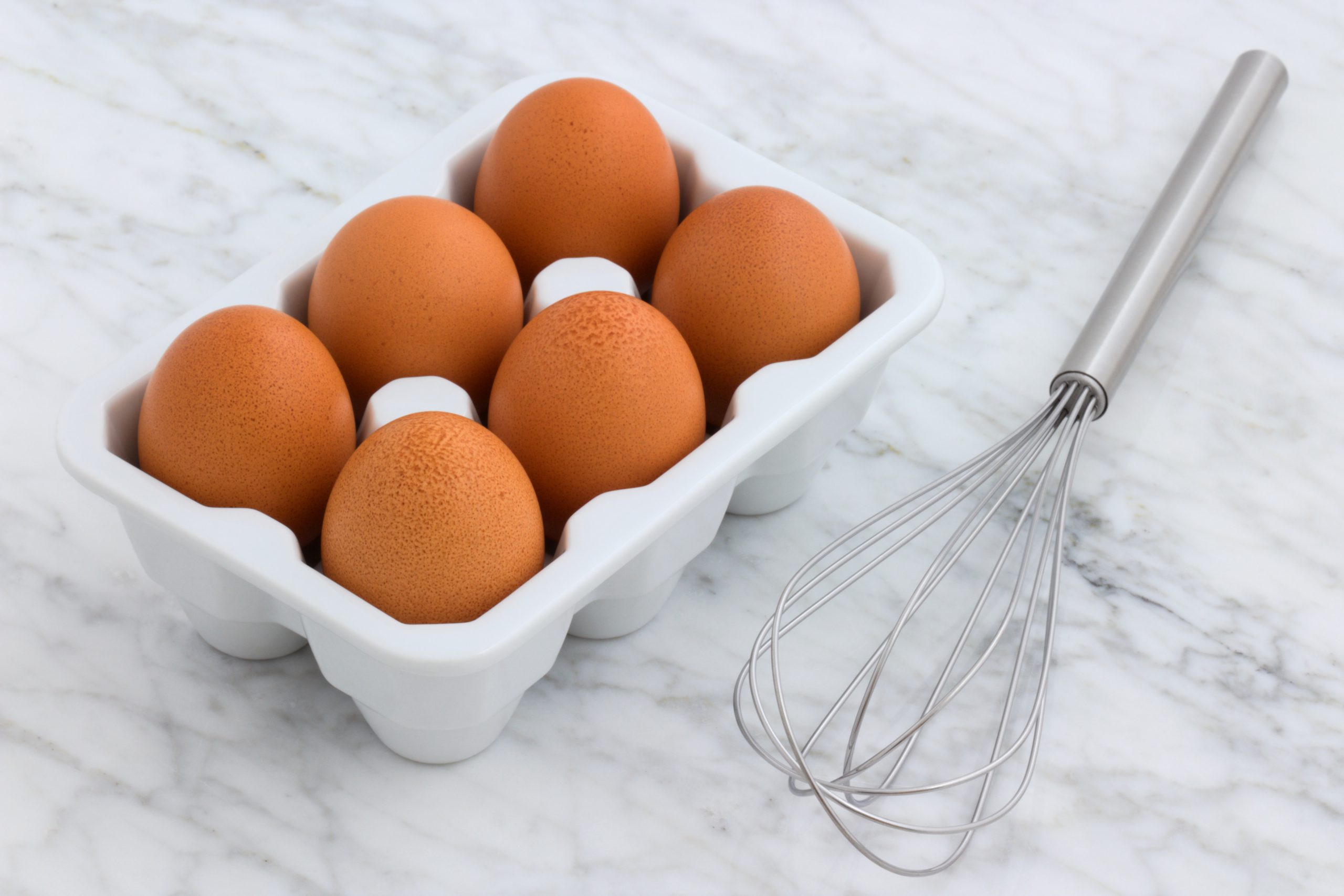In the hustle and bustle of modern life, it is easy to lose touch with our bodies and our inner peace. We are constantly exposed to stimuli and stressors that over-activate our autonomic nervous system. Fortunately, there are relatively easy and effective ways to bring our bodies and minds back into balance by activating our Vagus Nerve, a big and important nerve in our autonomic nervous system.
In this blog article, we will explain the simple basics about our Autonomous Nerve system, and you’ll discover how you can bring your body back into harmony through calm, nasal breathing, mindful exercise in nature, rest & recovery, cold showers, and healthy eating habits.
 Autonomic Nervous System
Autonomic Nervous System
The Autonomic Nervous System (ANS), or the involuntary nervous system, regulates important bodily functions, including heart rate, blood pressure, sweating, temperature, pupil dilation, and digestion. This system allows us to react and adjust these bodily functions without consciously thinking about them.
The ANS is divided into two components: the Sympathetic Nervous System (SNS) and the Parasympathetic Nervous System (PSNS). The SNS and PSNS, have opposing effects on several bodily functions. They work in conjunction to provide input to your body at all times. They’ll act to decrease or increase activities.
In a healthy system, when there is a perceived threat, the sympathetic will dominate. The bodily function will go into a ‘fight or flight’’ modus. When there are no threats, the parasympathetic will dominate. The bodily function will go into the ‘rest and digest’ modus.
 Sympathetic Nervous System – ‘FIGHT or FLIGHT’
Sympathetic Nervous System – ‘FIGHT or FLIGHT’
The sympathetic nervous system (SNS) directs your body’s rapid and involuntary response to all kinds of strain, such as danger, disease, exercise, and eating. See it as if the ‘power button of your internal system’ is switched on. Your body and mind are ready for action. This ‘fight or flight’ reaction is a survival mechanism, to be alert and react quickly to all kinds of stress. This is very useful in life-threatening situations, of course. But it also responds when perceiving a stressor, that is non-life threatening, like watching TV, managing external impulses (such as social media, emails, phone, etc), being nervous for an exam, having an argument, and even normal things like eating something or exercising. These are all kinds of stressors.
When the SNS detects a stressor, it immediately sends messages to organs, muscles, and glands to increase heart rate, dilate the bronchial tubes to your lungs, increase perspiration, and cause pupil dilation. While your body is busy responding to its stressors, the SNS inhibits non-vital functions such as digestion and salivation to stop energy from going to those organs and focus it on ‘saving your life’ or ‘passing that exam’.
 Parasympathetic Nervous System – ‘REST & DIGEST’
Parasympathetic Nervous System – ‘REST & DIGEST’
The parasympathetic nervous system (PSNS) works in opposition to the sympathetic system. It will manage the body’s ability to relax. Its main function is to down-regulate the body. It will use an important nerve, called the Vagus Nerve, which basically functions as “the button you can press to reduce stress”.
The PSNS works to tell your brain what’s happening within your body, instead of your brain telling your body what to do. It usually activates when you are feeling relaxed. The PSNS slows your heart and respiratory rates, narrows pupils, and increases digestion. It’s called the “rest and digest” system. Once the ‘danger’ is over or the stressful situation has passed, it returns the body to its natural activities, like digesting our food.
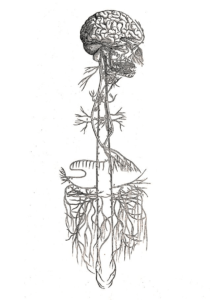 Vagus Nerve
Vagus Nerve
The vagus nerve serves as the body’s superhighway, carrying information between the brain and the internal organs and controlling bodily functions in times of rest and relaxation. This large nerve originates in the brain and branches out in multiple directions to the neck and torso. It wanders throughout the body transmitting information to tissues and organs. The nerve plays a critical role in letting your body know that things are going to be okay.
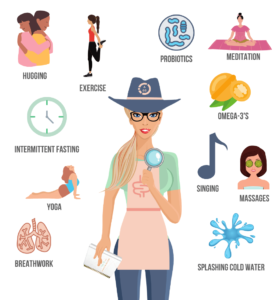
How to activate the vagus nerve?
The vagus nerve is analogous to a muscle: you can train it to get stronger. Increasing vagus nerve activity is one of the most practical ways to improve your overall wellness quickly. When we activate the vagus nerve, we stimulate the parasympathetic nervous system to return to the “rest & digest’ modus.
There are several ways to activate the vagus nerve, for example, calm breathing, mindful exercise, being outdoors, relaxation, massage, intermittent fasting, taking omega-3 supplements, and cold exposure. Behaviors like laughing, sex, and singing also activate the vagus nerve and in turn the parasympathetic nervous system.
 Calm Breathing
Calm Breathing
One of the easiest, yet super-powerful ways to activate the vagus nerve is to consciously breathe calmly and deeply.
There are many breathing exercises, and some just take a few minutes of your time and provide an immediate relaxing sensation. A really powerful effect will be noticeable if you’d do breath work every day for 10 minutes. Check out the Morefun2Run Breathwork pages for more details on different breathing exercises.
Exercise: Calm Nasal Deep Breathing – 2 minutes
- Sit or lay down in a relaxed position.
- Place a hand on your belly
- Inhale calmly through your nose, deep into your belly while activating your diaphragm. Your belly will expand while inhaling.
- Exhale slowly, either through your nose or through pursed lips.
- Extend the duration of exhalation, make it a few seconds longer than the inhalation. For example 4 counts for inhalation, and 6 counts per exhalation.
This exercise will slow down your breathing frequency, and lower your heart rate. Calming down the breathing helps to reduce stress and puts your body in a state of relaxation. Nasal breathing filters, warms, and humidifies the air before it reaches the lungs, making the breathing process and the uptake of oxygen more efficient. It will activate the vagus nerve and balance our nervous system.
 Outdoor Exercise
Outdoor Exercise
Physical movement is an integral part of restoring balance to the body and mind. Being active in fresh outdoor air and daylight will stimulate the vagus nerve. A natural environment has a calming effect on the mind and our nervous system. It helps you slow down the mind, relieve stress and bring body and mind back into harmony.
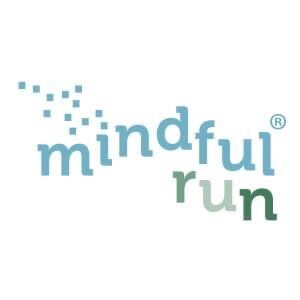 Mindful Run / Mindful Walk
Mindful Run / Mindful Walk
Running or walking mindfully combines the benefits of outdoor exercise with mindfulness and breathing techniques. During a mindful run, you don’t strive for athletic performance. Instead, you run (or walk) at an easy pace, while you shift attention to what your body is doing. The goal is to be fully in the present moment and consciously be aware of your physical movements and sensations, your thoughts, and emotions. Observe and experience without any judgment. This will help you feel your run, calm the mind, reduce stress, and activate the parasympathetic nervous system.
Mindful walks could easily become a daily habit. It doesn’t need to take much time or effort (it could be a daily lunch walk), but it can have a big impact on your overall well-being. Regular mindful walks will help you balance stress levels in your mind and body.
MoreFun2Run offers several Mindful Run or Walk courses and workshops in Ljubljana-Slovenia. For more details click on this LINK
 Relaxation
Relaxation
In addition to mindful exercise and calm breathing, it is also important to take time for relaxation. Getting enough, good quality sleep is crucial for optimal rest and recovery. A nice body massage may also be very effective. Or you can practice meditation or simply enjoy sitting in silence in nature.
 Nutrition
Nutrition
Recent studies show that your brain affects your gut health, and your gut may affect your brain health. The communication system between your gut and brain is called the gut-brain axis. Your gut and brain are connected physically through millions of nerves, most importantly through the Vagus Nerve. The gut and its microbes control inflammation and make many different compounds that can affect brain health.
 Happy gut, happy you!
Happy gut, happy you!
Make sure you eat a balanced and healthy diet that includes lots of vegetables, fruits, whole grains, and lean protein. Think of a rainbow of colors on your plate! Avoid eating processed foods that contain added sugar and salt. If you’re unsure of what you should be eating and how much to eat, talk to your doctor. He or she may refer you to a dietician for assistance.
Gut-Healthy Diet to Activate the Vagus Nerve
Altering the types of bacteria in your gut may benefit the gut-brain axis. The following dietary supplements and foods are associated with increased vagus nerve activity:
- Omega-3 fats: These types of fats are found in oily fish. Studies show that omega-3 has many physical benefits. It can optimize useful bacteria in the gut for better digestion and reduction of inflammation. It also supports heart, eye, skin, and joint health. Omega-3 also has several benefits for the brain. It reduces the risk of mental disorders. It can be used to treat and prevent depression and anxiety or to prevent age-related mental decline. It also improves the quality of sleep.
- Fermented foods (probiotics): Yogurt, kefir, tempeh, sauerkraut, kombucha, and cheese all contain healthy, beneficial bacteria. Fermented foods have been shown to improve digestive health, boost the immune system, improve brain health, and alter brain activity.
- High-fiber foods (prebiotics): Whole grains, nuts, seeds, fruits, and vegetables all contain dietary fibers that are good for your gut bacteria. Prebiotics are specific types of fiber, that can act as a good food source for probiotic bacteria. Together they can reduce stress hormones in humans
- Polyphenol-rich foods: these are compounds naturally found in plant foods, such as cocoa, green tea, olive oil, and coffee. There are over 8000 polyphenols, subdivided into 4 main groups: flavonoids, phenolic acids, polyphenolic amides, and other polyphenols. Studies have shown that polyphenol-rich foods may increase healthy gut and digestion, lower blood sugar levels, improve heart health, promote brain function, and improve cognition.
- Tryptophan-rich foods: Tryptophan is an essential amino acid (which your body cannot make) that is converted into the neurotransmitter serotonin. The benefits of serotonin are better sleep, relief from depression and anxiety, and increased well-being. Tryptophan can be found in foods that are high in protein, including chicken, turkey, tofu, soy, peanuts, eggs, and cheese.
Dietary supplements
A dietary supplement is an umbrella term that includes everything from vitamins and minerals. Before continuing on this topic: Dietary supplements are not a substitute for a balanced, healthful diet and healthy lifestyle practices. But they can be useful to ‘supplement’ (add to) someone’s diet. Many vitamins and minerals are essential, contributing to the body’s normal function.
 If -for whatever reason- it isn’t impossible for you to obtain enough vitamins and minerals through your normal diet, you could take good quality dietary supplements. As you age, malabsorption becomes a problem because your body does not have the same capability to break down and absorb nutrients as it used to. Some dietary supplements also may be beneficial if you have certain food allergies or intolerances, or have a disease or condition that affects nutrient intake.
If -for whatever reason- it isn’t impossible for you to obtain enough vitamins and minerals through your normal diet, you could take good quality dietary supplements. As you age, malabsorption becomes a problem because your body does not have the same capability to break down and absorb nutrients as it used to. Some dietary supplements also may be beneficial if you have certain food allergies or intolerances, or have a disease or condition that affects nutrient intake.
If you are searching for good quality nutritional supplements, I would recommend NeoLife products. I use them myself as well and I am an official distributor for NeoLife Nutritionals, Nutriance Skin Care, and Golden Home Care products. Please contact me to discuss your needs and I’ll provide you with personalized advice.
 Eat less frequently
Eat less frequently
Nowadays in the Western world, we have almost non-stop access to food and drinks. Many people have full fridges and pantries at home, and coffee shops, bakeries, and fast food restaurants can be found on every street corner. There is a constant temptation to snack.

It is important to know that every time we eat or drink something (caloric intake), our Sympathetic Nervous System will be activated. This stress reaction happens because ‘something foreign’ is entering the body through the mouth. The food or drink is initially detected as a ‘potential threat to our health’, which puts our system in the ‘fight or flight’ modus. If we would consume less frequently during the day, we would put our digestive system less frequently under this stress. The vagus nerve will then detect the information that the body can go back to ‘rest & digest’. Diet Tips: have three main meals a day that are healthy and satiating, and minimize sugar intake, so our bodies don’t feel the urge to snack in between meals.
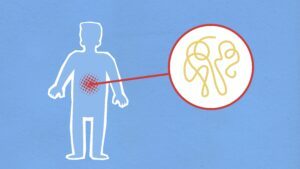 Intermittent Fasting
Intermittent Fasting
Consider Intermittent fasting to activate the vagus nerve. Intermittent fasting is an eating & drinking plan that switches between periods of fasting (no calorie intake at all) and eating/drinking on a regular schedule. The duration of the fasting period can vary from 14 hours per day to one or a few days in a row.
There are several intermitting fasting methods. A very popular one is the 16:8 schedule, which I’ve been doing myself for several years now. It basically involves fasting for 16 hours a day and consuming all calories during the remaining 8 hours. During the 8-hours ‘eating-window’ two or three meals are being consumed without any in-between-snacking. (not even an apple). During the fasting hours only water, and unsweetened coffee or tea can be taken.
As fasting also hosts several other benefits, including improved cognitive function, weight loss, and reduced inflammation, it may be worth a try. The best part: an intermittent fasting window doesn’t need to be extremely long to reap some great benefits.
 Cold showers
Cold showers
Exposure to cold is perfect training for the vagus nerve! Consider taking cold showers or ending your shower with a two-minute blast of ice-cold water. When turning the tap to cold, there is always the initial shock of the low temperature. But when you shift the attention away from this stress impulse by focusing on slowing down your breath, the cold will become bearable. The first time you may probably find it hard to stay in the cold water for up to 2 minutes, but if you do it on a daily base you can gradually extend the duration.
For a year or two, I have been finishing my regular warm showers with 2 minutes of cold water. Even in the middle of winter, when the tap water is much lower in temperature. I cannot say I love cold showers, but I must admit I feel super strong and energetic afterward. For the sake of training the brain and the benefits of activating the vagus nerve, I highly recommend it!
 If taking a cold shower sounds too scary or overwhelming to you, but you would like to experience the stress-relieving effect of cold exposure, you could apply an ice-cold washcloth to your face or hold some ice cubes in your hands.
If taking a cold shower sounds too scary or overwhelming to you, but you would like to experience the stress-relieving effect of cold exposure, you could apply an ice-cold washcloth to your face or hold some ice cubes in your hands.
 Activating Vagus Nerve will restore balance
Activating Vagus Nerve will restore balance
Summarising all the above: In our hectic world, it’s easy to get overwhelmed by stress and the hustle and bustle of everyday life. Activating our Vagus Nerve offers a simple and effective way to restore balance to the body and mind. Conscious calm nasal breathing, regular exercise, being outdoors, seeking relaxation, practicing mindfulness, and a healthy diet (if needed with additional food supplements), can activate the vagus nerve which stimulates the parasympathetic nervous system to return to the “rest & digest’ modus.
Stimulating the parasympathetic nervous system has numerous benefits for our well-being. It lowers heart rate and blood pressure, improves digestion, strengthens the immune system, and promotes a sense of calm and balance. It helps us to cope better with stressful situations and supports healthy sleep.
I hope this blog post has inspired you to activate the vagus nerve more frequently to release some of your daily stress and feel more energized. I’d be very grateful if you’d share this blog post on your own social media. Thank you! If you have any remarks or questions, please contact me by EMAIL or leave your comment below.








